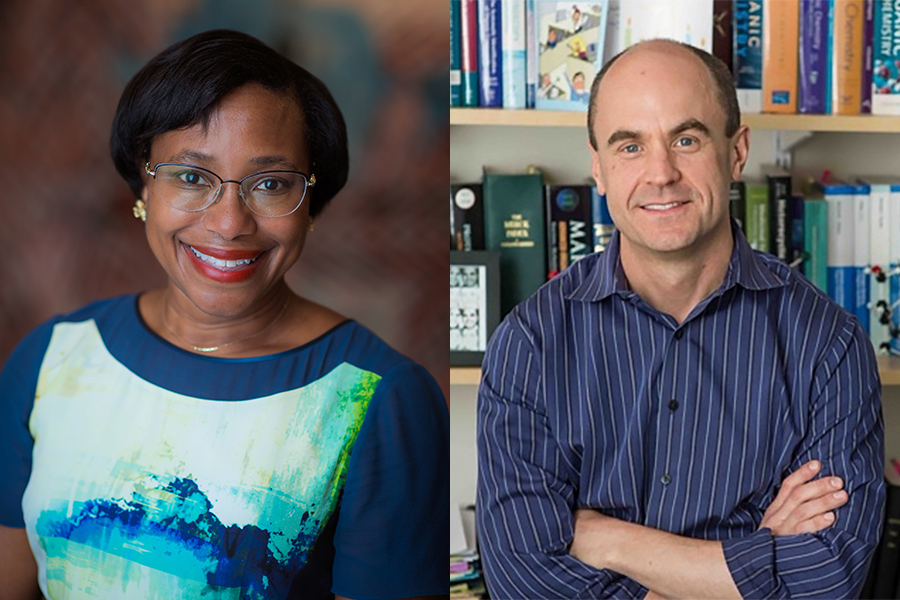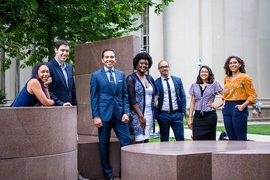Launched in June, the MIT Ad Hoc Committee on Graduate Advising and Mentoring is aimed at delivering a strategic plan to guide and inform the development of effective mentoring policies and programs that would be implemented at the Institute. Made up of 10 graduate students and 11 other members representing staff and faculty, the committee plans to include elements of the recommendations provided in a 2019 report from the National Academies of Sciences, Engineering and Medicine (NASEM) on the "Science of Effective Mentorship in STEMM."
Here, committee co-chairs Paula Hammond (Institute Professor and head of the Department of Chemical Engineering) and Tim Jamison (the Robert R. Taylor Professor of Chemistry and associate provost) discuss the committee’s origin and the work already underway across campus, and offer insight into the future of advising and mentoring at MIT.
Q: What motivated the creation of this committee?
Hammond: Effective graduate advising and mentoring are essential components of our mission as educators at MIT. Our work as a committee is timely and significant as we face a national reckoning on issues of sexual harassment and assault, structural racism, and misogyny. It is a clear opportunity for a change in culture and a shift in power dynamics. It’s with this context in mind that our work will support the imperative that all graduate students exit their programs with technical knowledge and confidence, and ownership of their research skills, and the practical tools they need to advance in the world. Students can achieve these through successful mentorship experiences.
As a department head, faculty often tell me there is a lack of sufficient guidance and uniform messaging on how to provide valuable mentoring experiences for their graduate students. We know faculty need access to tools and other resources to cultivate their mentoring skills and help them address difficult mentoring situations when they arise.
With the development and implementation of programs, resources, and policies that support and incentivize excellence in advising and mentoring, we can successfully create environments that meet our graduate students’ needs so they may prosper. In turn, the knowledge and innovations that stem from our research groups will also thrive. For faculty, their work environments will improve, and they will achieve a greater sense of fulfillment in their roles as advisors and mentors. Overall, effective mentorship benefits everyone, and this has been an expressed need on both sides.
Jamison: Several initiatives across campus have led up to the efforts of this ad hoc committee. For example, the Academic and Organizational Relationships (AOR) Working Group developed a series of recommendations in response to the National Academies report on the "Sexual Harassment of Women: Climate, Culture, and Consequences in Academic Sciences, Engineering, and Medicine." As co-chairs of the AOR Working Group, Paula and I worked with the committee members to develop recommendations to minimize the vulnerabilities in dependent professional relationships such as graduate students and faculty advisors.
In another initiative, the Academic Council approved a revision to Policies and Procedures 3.2, Tenure Process in fall 2020. This revision made excellence in mentoring and advising a criterion of tenure review.
In April 2021, Task Force 2021 and Beyond entered its second phase. One of the Refinement and Implementation Committees of this Task Force issued a proposal to review and recommend ways to enhance graduate advising and mentoring effectiveness.
Also in April, members of the Graduate Student Council (GSC) published a campus climate survey, which provided the Institute with recommendations about improving mentoring experiences, including establishing communication channels for students. We are grateful that two of the graduate students involved in conducting this GSC survey are now serving on this ad hoc committee. In June 2021, shortly after the committee first launched, the Graduate Womxn at MIT (gwaMIT) also issued a report of its findings and recommendations to improve the graduate experiences of women based on a series of focus group discussions among female MIT graduate students.
Q: What has the committee accomplished so far?
Jamison: Since the launch of the committee in June, our efforts have centered on creating the framework that will guide the development of MIT’s Strategic Plan on Graduate Advising and Mentoring. We developed our mission and vision statements and also established the strategic plan’s draft goals and objectives. These elements were informed by the findings of the Graduate Student Council survey and the gwaMIT report, as well as by the recommendations of the 2019 NASEM report on the science of effective mentorship. Recently, we launched a new website, which provides a summary of our charge and committee members, and will be used as one channel to provide updates to and feedback from the MIT community.
Hammond: Much of the strategic plan framework we developed thus far complements many ongoing efforts across the Institute. In 2020, the School of Engineering worked closely with the Center for the Improvement of Mentoring Experiences in Research (CIMER) to offer a pilot workshop using theoretically-grounded, evidence-based, and culturally-responsive training interventions and investigations for new faculty. The school designed the workshop to accelerate the acquisition of mentoring insights, address best practices, and cultivate productive mentee-mentor relationships. The Institute scaled a version of this workshop for all new faculty beginning this fall. The Institute also recently launched a transitional support program for graduate students who wish to change research advisors or groups. And, last but not least, the Office of Graduate Education continually announces their Committed to Caring faculty members in an ongoing celebration of MIT faculty members who go above and beyond to make an impact in the lives of graduate students.
Q: Looking ahead, what do you anticipate will be the most important impacts of this committee?
Hammond: A key focus of our efforts is creating an Institute-wide vision that cultivates a culture of excellence in advising and mentoring at MIT. We need a vision that fosters the well-being of, the high-quality research by, and the professional development of all graduate students and faculty. By establishing the necessary infrastructure to evaluate and improve advising and mentoring at the individual, department, school, and Institute levels, we will successfully support a rewarding mentoring experience for all.
Jamison: Mentoring and advising are fundamental responsibilities of our faculty. The greater their mentoring skills and the more they serve as positive influences and role models, the better the experience and greater the success of our graduate students in their professional pursuits. Moreover, the more successful the graduate students are, the more the faculty will also benefit. I believe firmly that this phenomenon — a “virtuous cycle of mentorship” — can and will be experienced by even more members of our community. That is, by improving the advising and mentoring of our graduate students, we will surely see powerful, positive long-term impacts on both graduate education and the Institute’s research enterprise.










